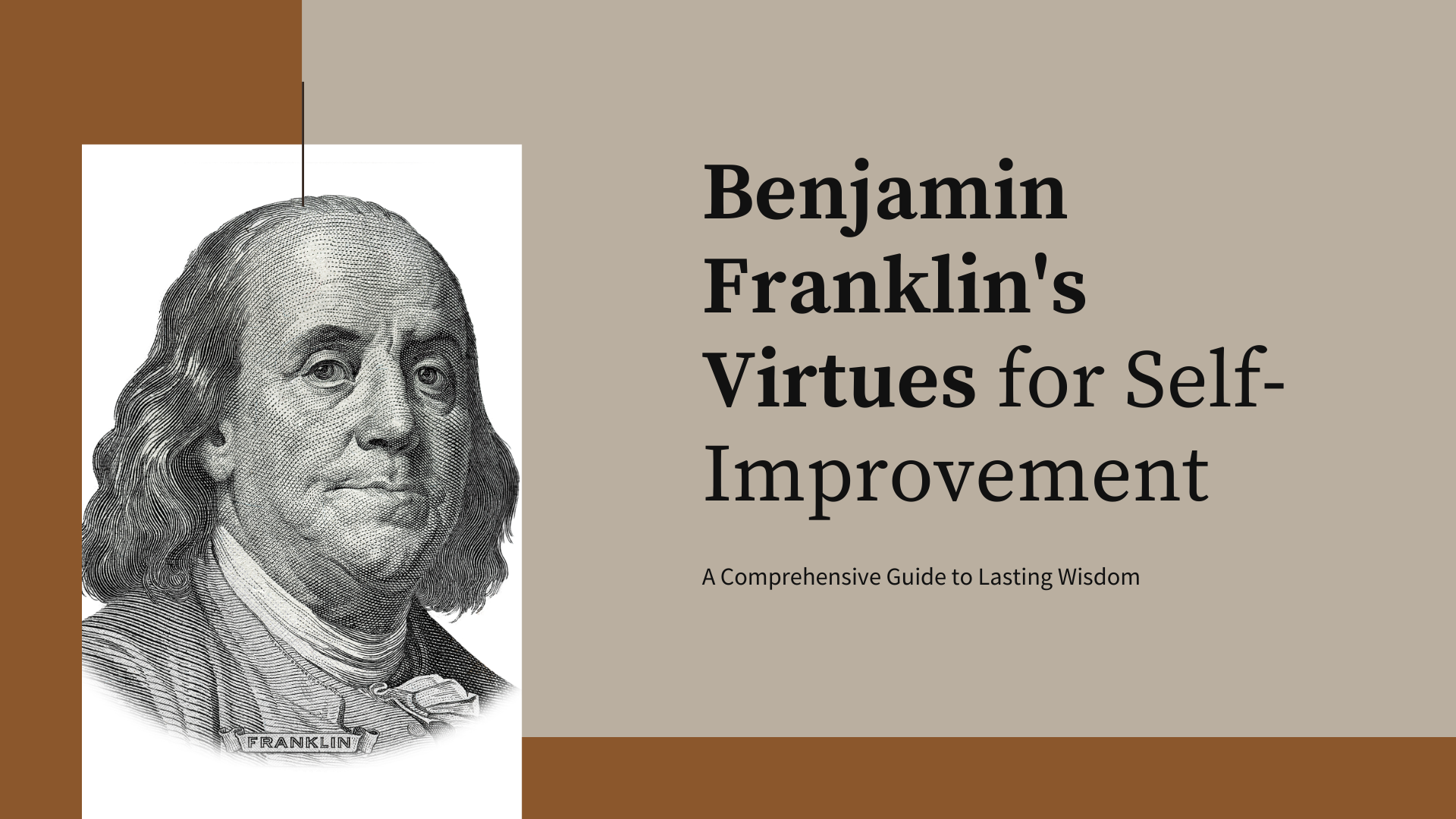Benjamin Franklin, one of America’s Founding Fathers, was not only a statesman and inventor but also a dedicated philosopher of self-improvement. His list of virtues, a guide to personal development, reflects his deep commitment to living a life of purpose, discipline, and service. Franklin’s thirteen virtues were designed to cultivate a well-rounded character and provide a roadmap for anyone seeking to grow in both moral and practical dimensions.

Have you wanted to accomplish more? Do you feel like you have reached a plateau in your life? Do you feel like you’re not progressing and improving fast enough? Solve all of this by using Franklin’s Notebook!
https://amzn.to/3NKiDq9 8.5 x 11
https://amzn.to/3Yvbv5W 6 x 9
The Origins of Franklin’s Virtues
In his early 20s, Franklin recognized his desire to become a better person, aiming to improve himself through regular reflection and practice. He outlined thirteen virtues, each representing an aspect of character he believed essential for living a fulfilling and moral life. He used a journal to track his progress, making a weekly effort to master each virtue. This system of self-reflection became a lifelong practice, underscoring his belief that self-improvement is a continuous journey.
The Thirteen Virtues
Here’s a closer look at Franklin’s thirteen virtues and what each one represents:
Temperance
“Eat not to dullness; drink not to elevation.”
Franklin believed moderation in food and drink was essential for clear thinking and good health. His emphasis on temperance was about maintaining self-control, which he saw as foundational to all other virtues.
Silence
“Speak not but what may benefit others or yourself; avoid trifling conversation.”
Franklin valued words that serve a purpose, aiming to avoid idle talk. For him, silence allowed space for thoughtfulness and enabled people to speak with intention.
Order
“Let all your things have their places; let each part of your business have its time.”
This virtue encouraged organization in life. Franklin knew that an orderly life helps one accomplish more and reduces stress, fostering both productivity and peace of mind.
Resolution
“Resolve to perform what you ought; perform without fail what you resolve.”
Franklin was a firm believer in follow-through. To him, making commitments and seeing them through was an indicator of integrity and strength of character.
Frugality
“Make no expense but to do good to others or yourself; i.e., waste nothing.”
For Franklin, frugality went beyond saving money; it was about valuing resources and using them wisely. This virtue encouraged him to make decisions that aligned with his values.
Industry
“Lose no time; be always employed in something useful; cut off all unnecessary actions.”
Hard work was essential in Franklin’s life. He emphasized the importance of using time wisely and dedicating oneself to purposeful activities.
Sincerity
“Use no hurtful deceit; think innocently and justly, and, if you speak, speak accordingly.”
Sincerity reflected Franklin’s commitment to truth and honesty. For him, genuine relationships and transparent interactions were central to a virtuous life.
Justice
“Wrong none by doing injuries, or omitting the benefits that are your duty.”
Franklin saw justice as the moral duty to treat others fairly and fulfill obligations. He believed that failing to help others or causing harm to them was a direct violation of this virtue.
Moderation
“Avoid extremes; forbear resenting injuries so much as you think they deserve.”
This virtue taught the value of balance and restraint, even in the face of challenges. Franklin saw moderation as a means to avoid excesses that could disrupt inner peace.
Cleanliness
“Tolerate no uncleanliness in body, clothes, or habitation.”
To Franklin, cleanliness was not only a matter of personal hygiene but a reflection of respect for oneself and one’s surroundings.
Tranquility
“Be not disturbed at trifles, or at accidents common or unavoidable.”
By valuing tranquility, Franklin encouraged calmness and resilience, especially in life’s minor annoyances. This virtue represents his wisdom in managing stress and focusing on what truly matters.
Chastity
“Rarely use venery but for health or offspring, never to dullness, weakness, or the injury of your own or another’s peace or reputation.”
Although controversial in Franklin’s time, chastity for him was about maintaining respect for oneself and others, using discretion and integrity in intimate relationships.
Humility
“Imitate Jesus and Socrates.”
Humility was Franklin’s way of keeping himself grounded. He believed in acknowledging his own limitations and learning from others, especially figures he deeply admired for their wisdom.
Living the Virtues Today
Franklin’s virtues offer timeless lessons in self-mastery and personal responsibility. They remind us that living a fulfilling life is not about perfection but about striving to improve. Franklin’s method was simple yet effective: he dedicated one week to focus on each virtue, reflecting on his progress and adjusting as needed. This rotating focus gave him the chance to build each habit gradually, understanding that true growth comes from small, consistent steps.
While some virtues, like chastity, might feel specific to Franklin’s time, most of these values resonate deeply in modern society. Practicing temperance, frugality, and sincerity can positively impact our well-being, while silence, order, and resolution can improve productivity and deepen our relationships.
Legacy of the Virtues
Franklin’s virtues were never meant to be a strict moral code but rather a guide to personal improvement, a way to bring intentionality to life. His virtues have influenced not only self-help enthusiasts but also thinkers, educators, and leaders worldwide who seek practical wisdom.
Today, we remember Benjamin Franklin not only as a Founding Father but as a model of disciplined self-improvement. His virtues encourage us to be mindful of our actions, considerate of others, and dedicated to a purpose greater than ourselves. Franklin’s approach teaches us that the pursuit of virtue, even if imperfect, is a journey worth taking – one that leads to a life rich in integrity, wisdom, and fulfillment.









Comments are closed